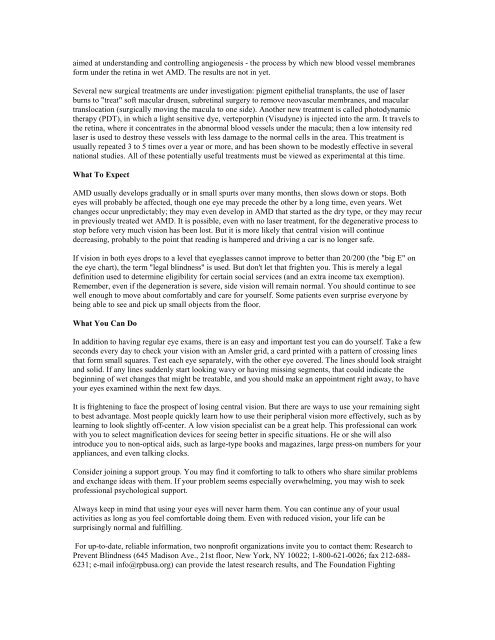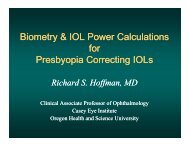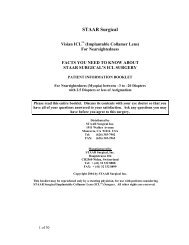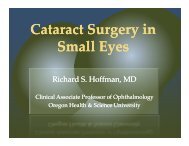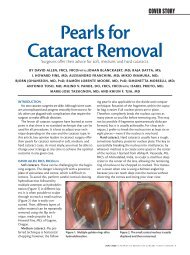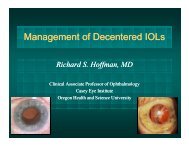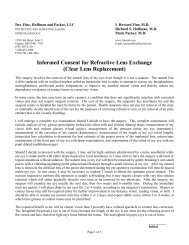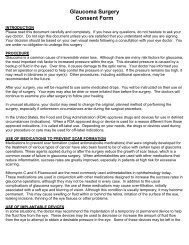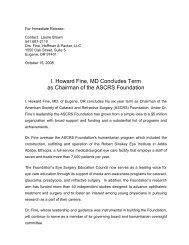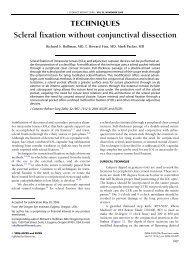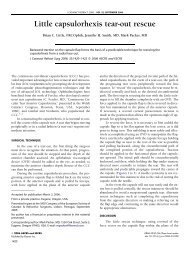Macular Degeneration - Drs. Fine, Hoffman and Packer
Macular Degeneration - Drs. Fine, Hoffman and Packer
Macular Degeneration - Drs. Fine, Hoffman and Packer
You also want an ePaper? Increase the reach of your titles
YUMPU automatically turns print PDFs into web optimized ePapers that Google loves.
aimed at underst<strong>and</strong>ing <strong>and</strong> controlling angiogenesis - the process by which new blood vessel membranes<br />
form under the retina in wet AMD. The results are not in yet.<br />
Several new surgical treatments are under investigation: pigment epithelial transplants, the use of laser<br />
burns to "treat" soft macular drusen, subretinal surgery to remove neovascular membranes, <strong>and</strong> macular<br />
translocation (surgically moving the macula to one side). Another new treatment is called photodynamic<br />
therapy (PDT), in which a light sensitive dye, verteporphin (Visudyne) is injected into the arm. It travels to<br />
the retina, where it concentrates in the abnormal blood vessels under the macula; then a low intensity red<br />
laser is used to destroy these vessels with less damage to the normal cells in the area. This treatment is<br />
usually repeated 3 to 5 times over a year or more, <strong>and</strong> has been shown to be modestly effective in several<br />
national studies. All of these potentially useful treatments must be viewed as experimental at this time.<br />
What To Expect<br />
AMD usually develops gradually or in small spurts over many months, then slows down or stops. Both<br />
eyes will probably be affected, though one eye may precede the other by a long time, even years. Wet<br />
changes occur unpredictably; they may even develop in AMD that started as the dry type, or they may recur<br />
in previously treated wet AMD. It is possible, even with no laser treatment, for the degenerative process to<br />
stop before very much vision has been lost. But it is more likely that central vision will continue<br />
decreasing, probably to the point that reading is hampered <strong>and</strong> driving a car is no longer safe.<br />
If vision in both eyes drops to a level that eyeglasses cannot improve to better than 20/200 (the "big E" on<br />
the eye chart), the term "legal blindness" is used. But don't let that frighten you. This is merely a legal<br />
definition used to determine eligibility for certain social services (<strong>and</strong> an extra income tax exemption).<br />
Remember, even if the degeneration is severe, side vision will remain normal. You should continue to see<br />
well enough to move about comfortably <strong>and</strong> care for yourself. Some patients even surprise everyone by<br />
being able to see <strong>and</strong> pick up small objects from the floor.<br />
What You Can Do<br />
In addition to having regular eye exams, there is an easy <strong>and</strong> important test you can do yourself. Take a few<br />
seconds every day to check your vision with an Amsler grid, a card printed with a pattern of crossing lines<br />
that form small squares. Test each eye separately, with the other eye covered. The lines should look straight<br />
<strong>and</strong> solid. If any lines suddenly start looking wavy or having missing segments, that could indicate the<br />
beginning of wet changes that might be treatable, <strong>and</strong> you should make an appointment right away, to have<br />
your eyes examined within the next few days.<br />
It is frightening to face the prospect of losing central vision. But there are ways to use your remaining sight<br />
to best advantage. Most people quickly learn how to use their peripheral vision more effectively, such as by<br />
learning to look slightly off-center. A low vision specialist can be a great help. This professional can work<br />
with you to select magnification devices for seeing better in specific situations. He or she will also<br />
introduce you to non-optical aids, such as large-type books <strong>and</strong> magazines, large press-on numbers for your<br />
appliances, <strong>and</strong> even talking clocks.<br />
Consider joining a support group. You may find it comforting to talk to others who share similar problems<br />
<strong>and</strong> exchange ideas with them. If your problem seems especially overwhelming, you may wish to seek<br />
professional psychological support.<br />
Always keep in mind that using your eyes will never harm them. You can continue any of your usual<br />
activities as long as you feel comfortable doing them. Even with reduced vision, your life can be<br />
surprisingly normal <strong>and</strong> fulfilling.<br />
For up-to-date, reliable information, two nonprofit organizations invite you to contact them: Research to<br />
Prevent Blindness (645 Madison Ave., 21st floor, New York, NY 10022; 1-800-621-0026; fax 212-688-<br />
6231; e-mail info@rpbusa.org) can provide the latest research results, <strong>and</strong> The Foundation Fighting


